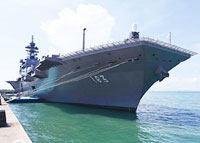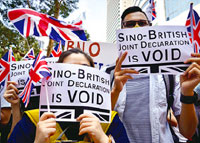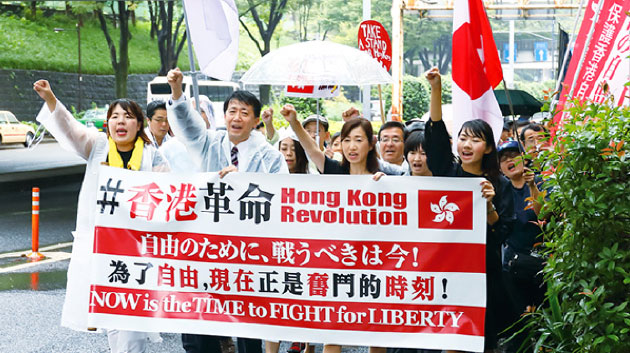Protect Hong Kong For True Peace Between China and Japan
Hong Kong Revolution
Photograph: In September, the Happiness Realization marched the streets of Shinjuku, Tokyo, in support of Hong Kong.

Ryoko Shaku
Party Leader of the Happiness Realization Party (Japan)
Shaku was born in 1969, in Tokyo. After obtaining a degree in history from Kokugakuin University, she began work at a Japanese firm before becoming a staff member at Happy Science. There she served in the magazine editorial team, and as an administrative executive before becoming the party leader of the HRP in 2013.
I visited Hong Kong on the 31st of August.
The previous day, many of the leading activists were arrested, and the people’s indignation had flared up.
But the protests I encountered in Hong Kong were very different from the “riots” that Japanese media claim them to be. There were many families with small children in the crowd, and at the square the people gathered to sing a hymn. At night, police intervention galvanizes the protests to heat up, but even in areas with many banks, there was no burglary. The journalist from France who I talked to exclaimed her surprise at the high standard of ethics.
It is actually the Hong Kong police that were getting more violent. That night, the Hong Kong police injured many civilians in their attempt to suppress the protests. Claudia Mo, a pro-democracy member of the Legislative Council, whom I met, explained that there had been 10 people injured, but authorities changed the number to 7. According to Mo, the 3 who disappeared from the official tally were those who were fatally wounded. Some even speculate that it was to cover 3 deaths.
Everyone was anxious about the possibility of a major military suppression of the protests ahead of the 70th anniversary of the People’s Republic on the 1st of October, which could become the second Tiananmen Square (at the time of writing, 18th September 2019).
Turning the Pro-China Tides
The U.S. has started a debate for legislating a Hong Kong Human Rights and Democracy Act. Great Britain, Hong Kong’s former suzerain state, has criticized the Extradition Bill, and German Chancellor Merkel has also been in direct contact with Chinese Premier Li Keqiang to protect the freedom and rights of the Hong Kong people.
During the G20 Summit in Osaka last June, Japanese Prime Minister Shinzo Abe told Xi Jinping that, “It is important for Hong Kong to prosper under the freedom promised in the One Country Two Systems policy,” but has since remained silent about the intensifying violence that the Hong Kong police are inflicting on the civilians.
China and Japan are strengthening economic ties, and Japan plans to welcome Xi next year as a guest of honor. There are also the Tokyo 2020 Olympics. If these factors are stopping Japan from raising her voice about the injustice done to Hong Kong, Japan will go back to being the economic animals they once were labeled. If the Abe government claims to be practicing value-oriented diplomacy, Abe should directly talk to Xi about protecting the freedom and democracy of Hong Kong. This is the way to true peace between China and Japan.
A: Deploying the SDF to Protect The Japanese Citizens
The Japanese government must prepare to rescue the 20,000+ Japanese citizens living in Hong Kong. If the People’s Liberation Army decides to encroach on Hong Kong, it is the Japanese government’s duty to deploy the Self-Defense Force to save her own citizens.
This idea may seem extreme, but the second Abe government’s first job was dealing with the In Amenas hostage crisis in 2013. Japanese companies were targeted, killing 10 citizens.
Learning from this incident should be the foundation stone of the Abe administration. For other countries around the world, the salvation of their citizens is a right of self-defense. In the very least, Japan must make preparations for deployment.
B: Change the National Defense Strategy
The Hong Kong problem is not unrelated to Japan. Japan must treat it like her own national problem, and make serious decisions about it. Already the seas around Okinawa and Senkaku are being patrolled by Chinese ships, and are thus invading territorial waters. Japan sending ships out to the waters near Hong Kong would be a clear sign of her intention to protect Taiwan and Senkaku.
Japan must raise her voice and state that the Hong Kong problem is a serious human rights issue. Japan must speak to China about the importance of peace, prosperity, democracy and freedom; and to lead them to becoming a country that respects human rights.
Column
How the World Can Save Hong Kong
The JSDF And Hong Kong Waters

(AFP/Aflo)
Japan is not thinking about deploying the SDF to protect Japanese citizens living in Hong Kong. But protecting citizens living under threat in foreign countries is a right of self-defense that is recognized as such in the Charter of the United Nations.
In 1976 when a hijacked passenger aircraft landed at an airport in Uganda, Israel immediately sent their special forces into Uganda without consent from the Ugandan government in order to rescue the Israeli hostages.
But does Japan have a proper law to protect her citizens in this way?
True, the SDF laws were amended after the In Amenas hostage crisis of 2013. But they made three tough conditions in exchange for the right to mobilize the SDF, one of which was that there must be proof of military combat. But if these rules cause Japan to hesitate, it might cause the deaths of Japanese citizens. This would go against Article 13 of the Constitution that declares each citizen’s rights to his or her life, liberty and happiness.
If something happens in Hong Kong, there is the possibility of legally sending the SDF troops to the harbor in Hong Kong under the pretext of a catastrophe. We can consider the protest suppressions to be a man-made catastrophe created by the Beijing government.
The helicopter carrier “Izumo” used by the Maritime SDF in the rescue missions after the 2016 earthquakes in Kumamoto prefecture can hold 450 passengers aside from the crew, and has adequate medical facilities and food supplies. And the very act of debating a deployment can become a deterrent in preventing a second Tiananmen Square from unfolding in Hong Kong.
The U.K. May Step Up

(AFP/Aflo)
The people of Hong Kong are beginning to seek help from their former suzerain, the U.K. In the 1980’s when the U.K. and China were negotiating the return of Hong Kong, they signed the Sino-British Joint Declaration, which promised that Hong Kong would be free from the socialist system in accordance with the One Country Two Systems principle, and have full rights to maintain a capitalist society for 50 years, while enjoying a high degree of autonomy except in foreign and defense affairs.
Beijing is now breaking this agreement. In other words, the U.K. is a former player in what became the current Hong Kong problem. So there is always the possibility that the U.K. will choose to step up.
British politicians are starting to respond to the cry for help. In August, MP Tom Tugendhat proposed that Hong Kong citizens should be given full U.K. citizenship. Prime Minister Boris Johnson has also expressed his support for the people of Hong Kong.
There are 4 ways that the U.K. may act if they choose to step up for the people of Hong Kong:
- Give full British citizenship to any citizens of Hong Kong who wish to do so
- The British citizenship bestowal would give Britain the right to send their military into Hong Kong to protect her citizens
- Britain could unilaterally declare that the people of Hong Kong are British citizens, on the grounds that China broke the Sino-British Joint Declaration.
- Britain could declare a no-deal annexation of Hong Kong. This could be possible if Japan shows an intention to support Hong Kong and proposes to cooperate with Britain.



















